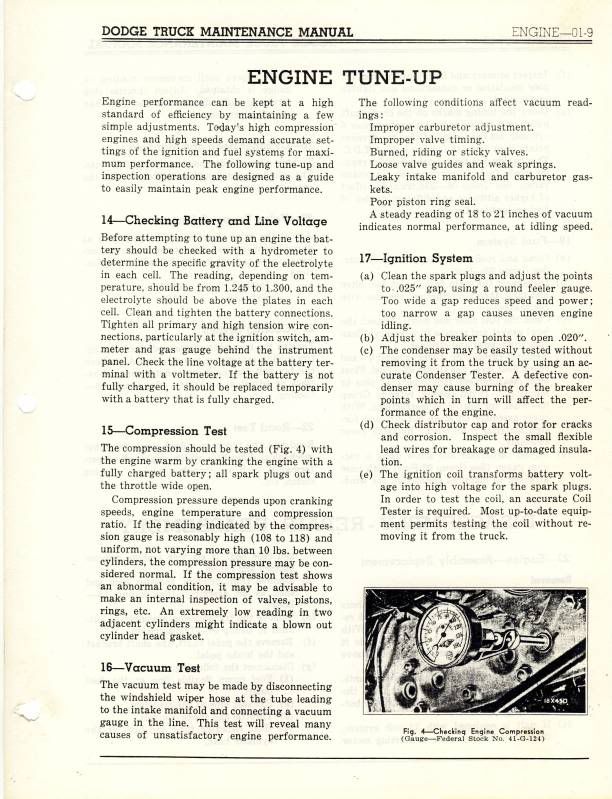LOW COMPRESSION
Moderators: Cal_Gary, T. Highway, Monkey Man, robi
LOW COMPRESSION
My 230 has 50-70 psi compression in all cylinders; It set in a field for several years before we adopted it.
Would like to run it until next winter before a rebuild. Any cheap ideas on how to make it run better til then?
Would like to run it until next winter before a rebuild. Any cheap ideas on how to make it run better til then?
1958 M37B1 all original
Re: LOW COMPRESSION
It could be a couple of things causing the low compression. You could try removing the plugs and squirting a liberal amount of penetrating oil in the cylinder. This will hopefully free up any stuck rings.bushboy63 wrote:My 230 has 50-70 psi compression in all cylinders; It set in a field for several years before we adopted it.
Would like to run it until next winter before a rebuild. Any cheap ideas on how to make it run better til then?
Also, if your oil pressure is ok, you can use a product called engine restore. It's an oil aditive that fills scratches in the cylinder walls. I get it at Canadian tire here and it's usually good for about a 20 lb bump in compression in old engines. The draw back is that if you have low oil pressure, it will crush out what's left of the bearings.
I took the road less travelled...now where the hell am I???
With compression that low, I'm pretty sure a rebuild is in order! Using penetrating oil to free up the rings might loosen them up a little, but it won't appreciably increase the compression.
Using "Engine Restore" is a bad idea. It doesn't actually "restore" anything and can block oil passages, which will make the rebuild that much harder and more expensive.
Sorry I had to say that!
Using "Engine Restore" is a bad idea. It doesn't actually "restore" anything and can block oil passages, which will make the rebuild that much harder and more expensive.
Sorry I had to say that!
"PER ARDUA AD ITER"
hmmm I have used it regularly on my vehicles, especially when they get to over 100K miles and never had any problems so long as the bearings were good. I think that maybe the difference is that my engines get regular oil changes and I don't allow them to get gunked up with sludge. I have heard others say the same thing that you have mentioned but that is usually with old engines that they don't know the history of.Lifer wrote:With compression that low, I'm pretty sure a rebuild is in order! Using penetrating oil to free up the rings might loosen them up a little, but it won't appreciably increase the compression.
Using "Engine Restore" is a bad idea. It doesn't actually "restore" anything and can block oil passages, which will make the rebuild that much harder and more expensive.
Sorry I had to say that!
I took the road less travelled...now where the hell am I???
For Bushboy: There's no need to remove all the plugs at once. The way you did it is just fine. We all do it that way. 
For Teoma: You seem to be using "engine restore" in well-maintained engines, which is probably unnecessary. Still, any compound designed to "fill in" scoring in the cylinder walls will also "fill in" oil passages, which is not a good thing.
The ads for these products are designed to make the buyer question the condition of his/her engine without a valid inspection and to instill a sense of confidence that all will be okay if you purchase their products. Other "miracle cures" include "fix-a-flat" for tires and "stop-leak" for radiators, just to name a couple. The one thing they all have in common is that your neighborhood mechanic will roundly curse the day he was born when a customer brings his/her car to him after using them.
For Teoma: You seem to be using "engine restore" in well-maintained engines, which is probably unnecessary. Still, any compound designed to "fill in" scoring in the cylinder walls will also "fill in" oil passages, which is not a good thing.
The ads for these products are designed to make the buyer question the condition of his/her engine without a valid inspection and to instill a sense of confidence that all will be okay if you purchase their products. Other "miracle cures" include "fix-a-flat" for tires and "stop-leak" for radiators, just to name a couple. The one thing they all have in common is that your neighborhood mechanic will roundly curse the day he was born when a customer brings his/her car to him after using them.
"PER ARDUA AD ITER"
Not all of us.
" For Bushboy: There's no need to remove all the plugs at once. The way you did it is just fine. We all do it that way. "
The way I was taught is to remove all the plugs and have the throttle wide open when doing the test.
 [/img]
[/img]
The way I was taught is to remove all the plugs and have the throttle wide open when doing the test.
 [/img]
[/img]Carter
Life Member:
Delta, Peach Bottom Fish & Game Assn.
Life Member:
Delta, Peach Bottom Fish & Game Assn.
Interesting read, Carter! I guess that's the way Dodge wanted it done. My Chilton's manual never mentioned doing it that way. I can understand doing the compression check when the engine is warm, but if it won't start ya still have to take a cold reading.
Also, why do they recommend an open throttle? Both valves are closed during the compression stroke and opening the throttle does not increase the amount of air drawn into the cylinder...only the fuel.
Also, why do they recommend an open throttle? Both valves are closed during the compression stroke and opening the throttle does not increase the amount of air drawn into the cylinder...only the fuel.
"PER ARDUA AD ITER"
Lifer wrote:Interesting read, Carter! I guess that's the way Dodge wanted it done. My Chilton's manual never mentioned doing it that way. I can understand doing the compression check when the engine is warm, but if it won't start ya still have to take a cold reading.
Also, why do they recommend an open throttle? Both valves are closed during the compression stroke and opening the throttle does not increase the amount of air drawn into the cylinder...only the fuel.
Lifer The TM for my M274 also specifies wide open throttle. Having the throttle plate fully open allows the intake stroke to pull in as much air as possible. If you start compression stroke at a slight vacuum (if the throttle plate restricted the air flow during intake) then the final compression reading would be lower.
I can see that restriction being significant in smaller engines as the air volume in the intake manifold is fairly small...I am not as sure that it in a larger multi cylinder engine with a large air volume in the intake manifold it would be a significant factor.
Also as to removing all the spark plugs...It will reduce /eliminate the intake manifold vacuum. Think that a good engine has 17inches vacuum at idle, starting a compression stroke with that much vacuum is bound to affect the final compression reading.
Paul f
-
CREEPING DEATH
- PFC

- Posts: 50
- Joined: Sun Nov 04, 2007 6:18 am
Haven't been back in a while Lifer, been putting disks, calipers and brake flex hoses on Sandy's car but Paul got exactly correct, thanks Paul, also, removing all the plugs speeds up the cranking of engine as it's not working against compression in the other cyls. which gives more uniform readings. Another way of saying what has already been said?
Carter
Life Member:
Delta, Peach Bottom Fish & Game Assn.
Life Member:
Delta, Peach Bottom Fish & Game Assn.




